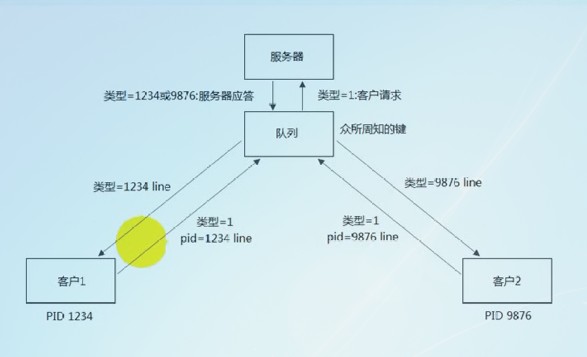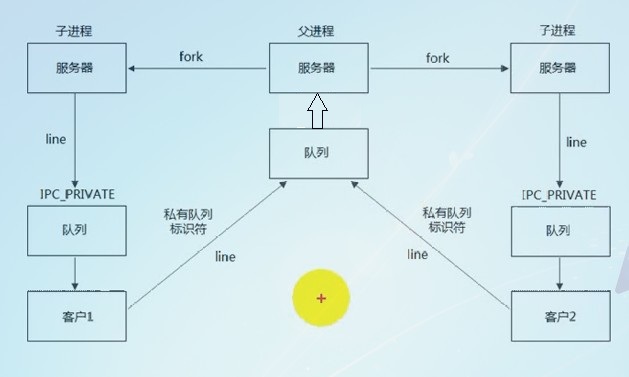第二十七章 system v消息队列(三)
消息队列实现回射客户/服务器

msg_srv.c
#include <stdio.h>
#include <stdlib.h>
#include <unistd.h>
#include <sys/types.h>
#include <sys/ipc.h>
#include <sys/msg.h>
#define ERR_EXIT(m) \
do \
{ \
perror(m); \
exit(EXIT_FAILURE); \
} while (0)
#define MSGMAX 8192
struct msgbuf {
long mtype; /* message type, must be > 0 */
char mtext[MSGMAX]; /* message data */
};
void echo_srv(int msgid)
{
int nRec = 0;
struct msgbuf msg;
while(1)
{
if( (nRec = msgrcv(msgid, &msg, MSGMAX, 1, 0)) < 0)
ERR_EXIT("msgsnd");
int pid;
pid = *((int*)msg.mtext);
fputs(msg.mtext+4,stdout);
msg.mtype = pid;
msgsnd(msgid, &msg, nRec, 0);
}
}
int main(int argc, char* argv[])
{
int msgid;
msgid = msgget(1234,IPC_CREAT|0666);
if(msgid == -1)
ERR_EXIT("msgget");
printf("msget success, msgid=%d\n",msgid);
echo_srv(msgid);
return 0;
}
msg_cli.c
#include <stdio.h>
#include <stdlib.h>
#include <unistd.h>
#include <sys/types.h>
#include <sys/ipc.h>
#include <sys/msg.h>
#include <string.h>
#define ERR_EXIT(m) \
do \
{ \
perror(m); \
exit(EXIT_FAILURE); \
} while (0)
#define MSGMAX 8192
struct msgbuf {
long mtype; /* message type, must be > 0 */
char mtext[MSGMAX]; /* message data */
};
void echo_cli(int msgid)
{
int pid,nRec;
struct msgbuf msg;
memset(&msg, 9, sizeof(msg));
pid = getpid();
*((int*)msg.mtext) = pid;
while(fgets(msg.mtext+4, MSGMAX, stdin) != NULL)
{
msg.mtype = 1;
if(msgsnd(msgid, &msg, 4+strlen(msg.mtext+4), 0) < 0)
ERR_EXIT("msgsnd");
memset(msg.mtext+4, 0, MSGMAX-4);
if( (nRec = msgrcv(msgid, &msg, MSGMAX, pid, 0)) < 0)
ERR_EXIT("msgsnd");
fputs(msg.mtext+4, stdout);
memset(msg.mtext+4, 0, MSGMAX-4);
}
}
int main(int argc, char const *argv[])
{
int msgid;
msgid = msgget(1234,0);
if(msgid == -1)
ERR_EXIT("msgget");
echo_cli(msgid);
return 0;
}
当服务器端收到客户端的请求之后,需要向客户端回射数据, 此时服务器端处于往消息队列发送消息的状态;
这时很多客户端发起很多的请求,将队列读满了,此时服务器端发送将阻塞;而客户端也阻塞等待读取数据,这时就产生了死锁
如果使用非阻塞的模式发送,因为队列满了,没有办法往消息队列中填充数据,会返回EAGAIN错误,又迫使服务器再次往消息队列中填充数据,此时客户端依旧无法获取到数据

msg_cli.c
#include <stdio.h>
#include <stdlib.h>
#include <unistd.h>
#include <sys/types.h>
#include <sys/ipc.h>
#include <sys/msg.h>
#include <string.h>
#include <signal.h>
#define ERR_EXIT(m) \
do \
{ \
perror(m); \
exit(EXIT_FAILURE); \
} while (0)
#define MSGMAX 8192
struct msgbuf {
long mtype; /* message type, must be > 0 */
char mtext[MSGMAX]; /* message data */
};
void echo_cli(int snd_msgid, int rcv_msgid)
{
int pid,nRec;
struct msgbuf msg;
memset(&msg, 9, sizeof(msg));
*((int*)msg.mtext) = rcv_msgid;
while(fgets(msg.mtext+4, MSGMAX, stdin) != NULL)
{
msg.mtype = 1;
if(msgsnd(snd_msgid, &msg, 4+strlen(msg.mtext+4), 0) < 0)
ERR_EXIT("msgsnd");
sleep(1);
memset(msg.mtext+4, 0, MSGMAX-4);
if( (nRec = msgrcv(rcv_msgid, &msg, MSGMAX, 2, 0)) < 0)
ERR_EXIT("msgrcv");
fputs(msg.mtext+4, stdout);
memset(msg.mtext+4, 0, MSGMAX-4);
}
}
int main(int argc, char const *argv[])
{
int snd_msgid, rcv_msgid;
snd_msgid = msgget(1234,0);
rcv_msgid = msgget(IPC_PRIVATE,0666);
if(snd_msgid == -1 || rcv_msgid == -1)
ERR_EXIT("msgget");
echo_cli(snd_msgid,rcv_msgid);
return 0;
}
msg_srv.c
#include <stdio.h>
#include <stdlib.h>
#include <unistd.h>
#include <sys/types.h>
#include <sys/ipc.h>
#include <sys/msg.h>
#define ERR_EXIT(m) \
do \
{ \
perror(m); \
exit(EXIT_FAILURE); \
} while (0)
#define MSGMAX 8192
struct msgbuf {
long mtype; /* message type, must be > 0 */
char mtext[MSGMAX]; /* message data */
};
void echo_srv(int msgid)
{
int nRec = 0;
pid_t pid;
struct msgbuf msg;
while(1)
{
if( (nRec = msgrcv(msgid, &msg, MSGMAX, 1, 0)) < 0)
ERR_EXIT("msgsnd");
fputs(msg.mtext+4,stdout);
pid = fork();
if(pid == 0)
{
int nSnd;
int rcv_msgid;
rcv_msgid = *((int*)msg.mtext);
msg.mtype = 2;
nSnd = msgsnd(rcv_msgid, &msg, nRec, 0);
if(nSnd == -1)
{
perror("msgsnd");
}
}
}
}
int main(int argc, char* argv[])
{
int msgid;
msgid = msgget(1234,IPC_CREAT|0666);
if(msgid == -1)
ERR_EXIT("msgget");
echo_srv(msgid);
return 0;
}



 浙公网安备 33010602011771号
浙公网安备 33010602011771号